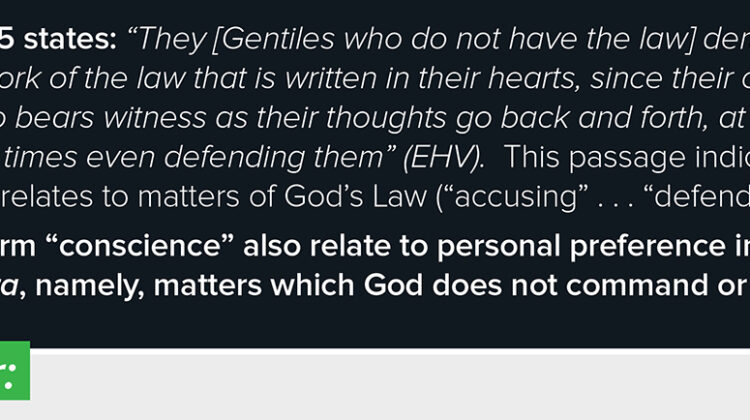
Question: Romans 2:15 states: “They [Gentiles who do not have the law] demonstrate the work of the law that is written in their hearts, since their conscience also bears witness as their thoughts go back and forth, at times accusing or at times even defending them” (EHV). This passage indicates that the conscience relates to matters of God’s Law (“accusing” . . . “defending”).
Does the term “conscience” also relate to personal preference in matters of adiaphora, namely, matters which God does not command or forbid?
Answer: The apostle Paul eloquently speaks of the conscience as the interpreter of the law written down on human hearts. The conscience both “bears witness” to what God demands in His Law and sits in judgment over our behavior. After the fall into sin, however, the conscience no longer provides a totally reliable witness concerning the will of God. The conscience can err—and often does. An erring conscience may permit behavior that God has clearly forbidden, rationalizing sin. An erring conscience may also forbid something that God has clearly allowed. For this reason, we turn to the Scriptures as the only place where God has fully revealed His unchanging will for our lives.
Yet Scripture, while it addresses most things, does not address everything. The term adiaphora (ah-dee-ah-for-ah) refers to matters where God has neither commanded nor forbidden what to do. In these areas, which are relatively rare, we let our consciences guide our actions.
In the Bible, the subject of adiaphora especially comes up in Paul’s discussions about the eating of meat in Romans and 1 Corinthians. In those days, most meat sold in the markets had been used in a pagan sacrifice to an idol. Yet eating meat was not a problem for most Christians. The majority of Christians understood that an idol was just a statue and that the gods those idols represented did not really exist (1 Corinthians 8:4-6). Since Christ had fulfilled the ceremonial law, God’s people were now permitted to eat all kinds of foods (Acts 10:10-16).
Yet for some recent converts to Christianity, eating meat bothered their consciences because they thought that doing so made them complicit in committing idolatry. So, if they did so, “their conscience, being weak, [was] defiled” (1 Corinthians 8:7, EHV). Their weak consciences caused them to feel guilty about something for which there was no reason to feel guilty.
Saint Paul urged the believers in Rome and in Corinth to be accommodating. He wanted those who were strong in their faith to lead the weak into a better understanding of the Word of God without giving offense so that the weak wouldn’t feel needlessly guilty. At the same time, Paul instructed those whose consciences were easily bothered to keep from accusing as sinful those who could eat meat with a good conscience. He said, “The one who eats everything should not look down on the person who does not do so, and the one who does not eat everything should not judge the person who does, because God has accepted him” (Romans 14:3, EHV).
In those rare cases where God has neither commanded nor forbidden us to do something, there is room for personal preference. Yet there is a difference between “conscience” and “personal preference.” Personal preference has to do with “What I would rather do?” “Conscience” wrestles with the question: “Is this right in the sight of God?” Someone’s personal preference may be to sleep in on Saturday morning, but their conscience reminds them of all the work that needs to be done. To “dress up” personal preference as a matter of conscience would be a sinful violation of the Second Commandment because that person is dragging God’s name into the matter. (Martin Luther’s treatment of the Second Commandment in his Large Catechism addresses this in greater detail.)
Nor can Christians continually hide behind a weak conscience to avoid growing in their understanding of God’s will. When believers’ consciences are strengthened through God’s Word, they will leave their former way of understanding behind.
As much as we try to keep our consciences clean, we are going to fail because we are sinners in need of a Savior. In the end, the best cure for the conscience is the promise of forgiveness of sins through faith in Jesus Christ, received in our baptisms, which gives all of us the pledge of a clean conscience before God (1 Peter 3:21).
Rev. Piet Van Kampen